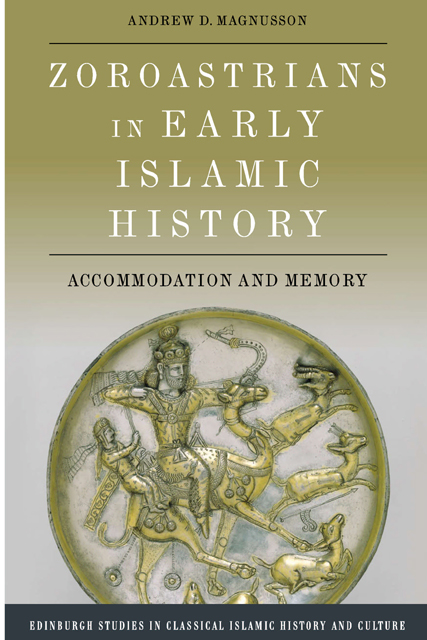Book contents
- Frontmatter
- Contents
- Acknowledgements
- A Note on Transliteration and Abbreviation
- Dedication
- Introduction: Zoroastrianism, Islam and Accommodation
- 1 Myth and Countermyth in Zoroastrian Historiography
- 2 Umar’s Dilemma: The Taxation of People Without a Book
- 3 Marriage, Meat and the Limits of Accommodation
- 4 Salman’s Charter as a Site of Memory
- 5 Fire Temple Desecration and Triumphal Tales of Violence
- 6 Rhetorical Zoroastrians in Early Islamic Discourse
- Conclusion: An Ambivalent Accommodation
- Appendix A Translation of an Iranian Recension of Salman’s Charter
- Appendix B Translation of an Indian Recension of Salman’s Charter
- Bibliography
- Index
Conclusion: An Ambivalent Accommodation
Published online by Cambridge University Press: 25 April 2023
- Frontmatter
- Contents
- Acknowledgements
- A Note on Transliteration and Abbreviation
- Dedication
- Introduction: Zoroastrianism, Islam and Accommodation
- 1 Myth and Countermyth in Zoroastrian Historiography
- 2 Umar’s Dilemma: The Taxation of People Without a Book
- 3 Marriage, Meat and the Limits of Accommodation
- 4 Salman’s Charter as a Site of Memory
- 5 Fire Temple Desecration and Triumphal Tales of Violence
- 6 Rhetorical Zoroastrians in Early Islamic Discourse
- Conclusion: An Ambivalent Accommodation
- Appendix A Translation of an Iranian Recension of Salman’s Charter
- Appendix B Translation of an Indian Recension of Salman’s Charter
- Bibliography
- Index
Summary
Just a decade ago, the contemporary relevance of some of the issues treated in this book – from the taxation of Zoroastrians to their legal status in medieval Islamdom – may not have been readily apparent to the nonspecialist. However, their significance and, indeed, their urgency, became undeniable with the rise of the Islamic State of Iraq and Syria (ISIS) in 2014. ISIS emerged from the aftermath of the United States’ invasion of Iraq in 2003 and the eruption of the Arab Spring in Syria in 2011. The organisation’s complex history, including its evolution from al-Qaeda in Iraq to the Islamic State of Iraq and the latter’s fraught relationship with the Nusra Front, a militia fighting in Syria’s civil war, has been documented elsewhere and will not be repeated here. Suffice it to say that Abu Bakr al-Baghdadi, previously leader of the Islamic State of Iraq, attempted to siphon fighters from the Nusra Front by declaring the creation of ISIS to coordinate attacks in both countries. He also opened a new front in the Islamic State’s insurgency against the Iraqi government by ordering the invasion of northern Iraq from Syria.
In June 2014, ISIS came roaring across the Syrian border into Iraq. Thus began a brutal campaign of conquest, rape and enslavement of the local population in the process of creating a caliphate. ISIS fighters descended on the Kurdish region of Sinjar (Shingal in Kurdish), massacring men and raping women. Survivors fled to the mountains for protection. Between August and September, the forces of the Islamic State displaced approximately 100,000 people, killing an estimated 5,000 men and enslaving 7,000 women in the process. The Iraqi army, trained and equipped by the United States, fled in fear. The Obama Administration began airstrikes against ISIS in the name of humanitarian intervention, which quickly expanded beyond their stated purpose of protecting Kurds into a full-scale war against ISIS to prevent it from toppling the Iraqi government.
ISIS justified the violence against the Kurds of Sinjar in religious terms. Its fighters claimed that Yazidi Kurds lacked a divinely revealed religion and were therefore undeserving of the protection that Muslims have historically afforded to Jews and Christians. Yazidis, who call themselves Ezedi, are monotheistic. They claim to be proselytes of a twelfth-century Sufi Muslim from Lebanon, Adi ibn Musafir al-Umawi.
- Type
- Chapter
- Information
- Zoroastrians in Early Islamic HistoryAccommodation and Memory, pp. 159 - 166Publisher: Edinburgh University PressPrint publication year: 2022



